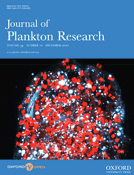
JOURNAL OF PLANKTON RESEARCH
Scope & Guideline
Unveiling the Ecological Secrets of Plankton
Introduction
Aims and Scopes
- Ecology and Biodiversity of Plankton:
Focuses on understanding the ecological interactions and biodiversity of planktonic organisms across different aquatic environments, including freshwater and marine ecosystems. - Physiological and Morphological Adaptations:
Investigates the physiological and morphological traits of plankton, including adaptations to environmental changes, which are crucial for their survival and ecological roles. - Trophic Dynamics and Food Web Interactions:
Explores the trophic interactions within plankton communities and their roles in food webs, including studies on predation, grazing, and nutrient cycling. - Impact of Climate Change and Anthropogenic Influences:
Analyzes the effects of climate change and human activities on plankton populations, distributions, and community structures, contributing to understanding ecological responses. - Technological Advancements in Plankton Research:
Utilizes innovative technologies, such as eDNA metabarcoding, imaging techniques, and modeling approaches, to enhance plankton research and monitoring.
Trending and Emerging
- Molecular and Genomic Approaches:
An increasing trend in the application of molecular techniques, such as eDNA metabarcoding, is evident, highlighting the importance of genetic analysis in understanding plankton diversity and community structure. - Climate Change Impact on Plankton Dynamics:
Research addressing the implications of climate change on planktonic ecosystems is on the rise, reflecting growing concern over environmental changes and their effects on aquatic life. - Mixotrophy and Nutritional Strategies:
There is a marked increase in studies exploring mixotrophy among plankton, emphasizing the ecological significance of these organisms in nutrient cycling and food webs. - Technological Innovations in Monitoring:
The use of advanced technologies for plankton monitoring, such as automated imaging and machine learning, is becoming more prevalent, facilitating real-time data collection and analysis. - Functional Ecology and Ecosystem Services:
A shift towards understanding the functional roles of plankton in ecosystems and their contributions to services such as carbon cycling and water quality is emerging as a key theme.
Declining or Waning
- Historical Taxonomy Studies:
There has been a noticeable decline in papers focused solely on historical taxonomic classifications of plankton species, suggesting a shift towards more ecological and functional studies. - Traditional Sampling Methods:
Research employing traditional plankton sampling techniques appears to be decreasing, as more advanced methodologies, such as automated imaging and molecular approaches, gain prominence. - Regional Studies with Limited Scope:
Publications focusing on very localized or specific regional studies have declined, as researchers increasingly aim for broader ecological insights and global comparisons.
Similar Journals
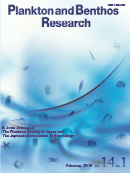
Plankton & Benthos Research
Championing the Study of Essential Aquatic OrganismsPlankton & Benthos Research, published by the Plankton Society of Japan, serves as a pivotal platform in the fields of Aquatic Science, Ecology, and Oceanography. With its inception in 2006 and ongoing publication until 2024, this esteemed journal focuses on the complex interactions within aquatic ecosystems, emphasizing the significance of plankton and benthic organisms in maintaining ecological balance. Although it is categorized in the Q3 quartile across several disciplines, it continues to provide valuable insights and a forum for researchers to share innovative findings and methodologies. The journal is not currently open access, which ensures a layer of curator-driven content quality. Its impact, measured through Scopus rankings, showcases its role in fostering knowledge exchange among academics and professionals engaged in ecological and environmental studies. With an ISSN of 1880-8247 and E-ISSN 1882-627X, Plankton & Benthos Research invites contributions that enhance our understanding of the aquatic realm, establishing itself as a crucial resource for ongoing research and advancement in these essential fields.
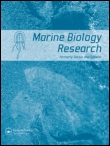
Marine Biology Research
Navigating the intersection of ecology and oceanography.Marine Biology Research is a premier journal published by Taylor & Francis, focusing on the dynamic field of marine biology and its intersecting realms of aquatic science, ecology, and oceanography. Since its inception in 2005, this journal has served as a crucial platform for researchers and professionals to disseminate their findings, with a vision extending to 2024 and beyond. The journal is recognized with a Q3 quartile ranking in both Aquatic Science and Ecology, Evolution, Behavior and Systematics, underscoring its growing influence in these fields as evidenced by its Scopus rankings. Located in the United Kingdom, Marine Biology Research aims to foster collaboration and innovation through open access options, facilitating knowledge exchange among the academic community. With a steady commitment to advancing marine sciences, this journal is an invaluable resource for those dedicated to understanding and preserving our ocean ecosystems.
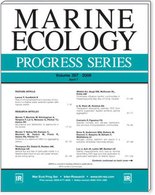
MARINE ECOLOGY PROGRESS SERIES
Exploring the depths of marine ecology.MARINE ECOLOGY PROGRESS SERIES, published by INTER-RESEARCH in Germany, is a premier journal dedicated to advancing the field of marine ecology. Renowned for its rigorous peer-review process and high-quality publications, it holds a Q1 ranking in various categories including Aquatic Science and Ecology according to the 2023 category quartiles. With an impressive Scopus ranking, the journal is positioned in the 80th percentile within the Ecology, Evolution, Behavior and Systematics field, attesting to its significant impact in marine research. Covering a broad scope from basic ecological research to applied marine science, MARINE ECOLOGY PROGRESS SERIES aims to facilitate scientific exchange and promote the understanding of marine ecosystems. Researchers and professionals looking to stay abreast of the latest developments and findings in marine ecology will find this journal indispensable for enhancing their knowledge and contributing to ongoing discussions in the field.

Journal of Ecohydraulics
Innovating the intersection of ecology and hydraulics.The Journal of Ecohydraulics, published by Taylor & Francis Ltd, stands as a premier platform for interdisciplinary research, merging the disciplines of civil engineering, water science, and environmental management. With an ISSN of 2470-5357 and an E-ISSN of 2470-5365, this esteemed journal, based in the United Kingdom, has been recognized within the top quartile (Q1) in both Civil and Structural Engineering and Water Science and Technology categories. Its impactful research, reflected in its notable Scopus rankings—#40 out of 261 in Environmental Science and #69 out of 379 in Engineering—underscores its vital role in advancing knowledge and addressing the critical challenges posed by the interaction of ecological and hydraulic systems. The journal invites contributions that explore innovative methodologies and sustainable practices relevant to ecohydraulics, fostering a robust dialogue among researchers, professionals, and students interested in the sustainable management of aquatic and terrestrial environments.

International Journal of Limnology
Fostering Global Collaboration in LimnologyThe International Journal of Limnology, published by EDP SCIENCES S A, is a cutting-edge journal dedicated to the field of aquatic sciences, with a strong emphasis on limnology—the study of inland waters. Headquartered in France, the journal serves as a vital resource for scholars and practitioners alike, aiming to advance the understanding of freshwater ecosystems and their management. With an e-ISSN of 2823-1465 and classified within the Q3 category of the 2023 Aquatic Science quartiles, it occupies a significant niche in academic research, ranking 150 out of 247 in Scopus listings. The journal’s open access policy ensures that research findings are widely disseminated, facilitating collaboration and innovation across global aquatic science communities. Published continuously from 2022 to 2024, the International Journal of Limnology aspires to contribute to sustainable practices and enhance ecological understanding, making it an essential publication for researchers, professionals, and students committed to the stewardship of aquatic resources.
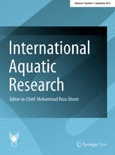
International Aquatic Research
Advancing aquatic knowledge for a sustainable future.International Aquatic Research, published by the Islamic Azad University, Tonekabon Branch, is a vital open-access journal dedicated to advancing the field of aquatic sciences since its inception in 2009. With an ISSN of 2008-4935 and an E-ISSN of 2008-6970, the journal plays a significant role in disseminating high-quality research findings from Iran and around the globe. It covers a broad range of topics in aquatic biology, fisheries science, and marine ecology, making it a valuable resource for researchers, professionals, and students alike. As of 2023, it ranks in the third quartile (Q3) of the aquatic science category with a Scopus rank of #138 out of 247 in Agricultural and Biological Sciences, reflecting its growing influence in the field. With a commitment to promoting scientific knowledge and fostering collaboration among aquatic research communities, International Aquatic Research is positioned as an essential platform for those dedicated to understanding and conserving marine and freshwater environments.
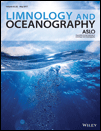
LIMNOLOGY AND OCEANOGRAPHY
Exploring the Depths of Aquatic ScienceLimnology and Oceanography is a premier peer-reviewed journal published by Wiley that has been at the forefront of aquatic sciences since its inception in 1956. With an impressive impact factor placing it in Q1 in both Aquatic Science and Oceanography categories, this journal showcases cutting-edge research and studies relevant to the dynamics of freshwater and marine ecosystems. Limnology and Oceanography serves as a vital platform for researchers, professionals, and students to disseminate their findings and foster a deeper understanding of aquatic environments. The journal does not currently offer open access, but it provides a unique opportunity for scholars to contribute to a body of work that influences policy, conservation efforts, and the scientific community at large. With its substantial ranking in Scopus as #12 in Aquatic Science and #9 in Oceanography, Limnology and Oceanography remains a critical resource for advancing knowledge in these vital fields.
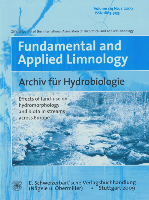
Fundamental and Applied Limnology
Unveiling Aquatic Mysteries: A Platform for Freshwater ScholarshipFundamental and Applied Limnology is an esteemed academic journal dedicated to the exploration of freshwater ecosystems, bridging the gap between fundamental research and practical applications. Published by E Schweizerbart'sche Verlagsbuchhandlung in Germany, this journal has been a vital resource in the fields of aquatic science and ecology since its inception in 2007. With its ISSN 1863-9135 and E-ISSN 1863-9135, it provides a platform for researchers to disseminate significant findings related to limnology, contributing to a rich understanding of freshwater biodiversity, water quality, and ecological interactions. Although currently rated in the Q3 quartile for aquatic sciences and ecology as per the 2023 rankings, it remains a valuable outlet for interdisciplinary research and practical insights, facilitating critical advancements in environmental management. Open access options enhance its visibility and accessibility, making it indispensable for researchers, professionals, and students alike who are committed to advancing the scholarship in freshwater studies. Engaging with this journal not only opens doors to the latest research findings but also fosters collaboration and innovation in the ecological community.

MARINE AND FRESHWATER RESEARCH
Navigating the currents of marine and freshwater science.Marine and Freshwater Research is a prestigious journal published by CSIRO PUBLISHING that serves as a key platform for the dissemination of cutting-edge research in the fields of Aquatic Science, Ecology, and Oceanography. With an impactful presence since its inception in 1948, the journal provides critical insights into the dynamics of freshwater and marine ecosystems, promoting interdisciplinary approaches that contribute to our understanding of biodiversity and sustainability. Currently ranked in the Q2 category across major scientific domains, including Ecology and Aquatic Science, it enjoys a robust academic reputation supported by impressive Scopus rankings, such as Rank #66/247 in Aquatic Science and Rank #44/145 in Oceanography, reflecting its high citation impact and relevance. While offering a subscription-based access model, the journal remains dedicated to fostering dialogue and innovation within the scientific community, aiming to bridge the gap between research findings and practical applications in environmental management. Located in Australia, Marine and Freshwater Research is an essential resource for researchers, professionals, and students dedicated to exploring the complexities of aquatic ecosystems and advocating for their preservation.

BIOLOGY BULLETIN
Bridging Gaps in Biological Research for Global Impact.BIOLOGY BULLETIN is a prominent academic journal published by PLEIADES PUBLISHING INC, dedicated to advancing the fields of Agricultural and Biological Sciences as well as Biochemistry, Genetics, and Molecular Biology. With an ISSN of 1062-3590 and E-ISSN of 1608-3059, the journal has been a vital resource for researchers and professionals since its commencement in 1996. Located in the United States, BIOLOGY BULLETIN operates within a highly competitive academic landscape, achieving a 2023 ranking in the Q3 quartile for Agricultural and Biological Sciences and Q4 for Biochemistry, Genetics, and Molecular Biology, highlighting its commitment to delivering impactful research despite its challenges. Researchers seeking to publish their findings will find a platform for significant insights, as reflected in its Scopus rankings, where it stands at #183 and #199 out of 221 in its respective categories, showcasing opportunities for growth and visibility. While currently not an open-access publication, BIOLOGY BULLETIN plays a crucial role in facilitating scholarly communication and fostering an understanding of biological sciences, making it an essential read for academics, professionals, and students alike.